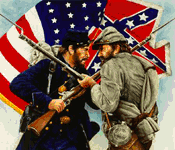 |
Civil War Battles |
|
State War Records |
| AL - AK - AZ - AR - CA - CO - CT - DE - FL - GA - HI - ID - IL - IN - IA - KS - KY - LA - MA - MD - ME - MI - MN - MS - MO - MT - NE - NV - NH - NJ - NM - NY - NC - ND - OH - OK - OR - PA - RI - SC - SD - TN - TX - UT - VT - VA - WA - WV - WI - WY |
The Surrender of Richmond
April 3, 1865 in Richmond, Virginia

On April 2, Gen. Robert E. Lee sent a message to President Jefferson Davis that he could not hold the Union army at bay anylonger. Both Petersburg and Richmond would have to be evacuated. Lee's message said, "I think it is absolutely necessary that we should abandon our position to-night."
When Davis received the message while at church service, he was utterly shocked. He read the message and quietly left the church. He readied his government to leave. The government officials were to bring boxcarloads of important papers, goods, and materials while destroying anything that could not be carried off with them.
Davis wrote a message for the people of the Confederacy. The message admitted "the great moral as well as material injury to our cause," that resulted from the loss of the cities. He asked the people to "not to despond" but to "meet the foe with fresh defiance, with unconquered and unconquerablke hearts." With this, the order to evacuate the cities was given.
On April 3, the evacuation of Richmond was carried out quickly. A mob scene did not take very long to gather. Looting of stores and homes and the destruction of them occured throughout the city. The Confederate government ordered troops to set fire to all of the cotton, tobacco, and munition warehouses to keep them from falling into Union hands. The warehouse fires soon raged out of control, burning multiple areas of the city. This caused all kind of panic with the civilian population.
Lt. Gen. Ulysses S. Grant heard of all the pandimomium occuring in Richmond and quickly moved his army to occupy the city before too much destruction occured.
At 8:15 A.M., the mayor of Richmond, Joseph Mayo, surrendered the city to the arriving Union army. Even though they knew it was going to happen, the citizens were still stunned at the surrender.
